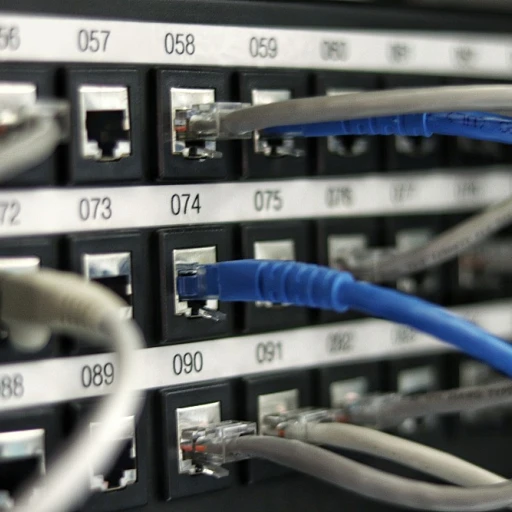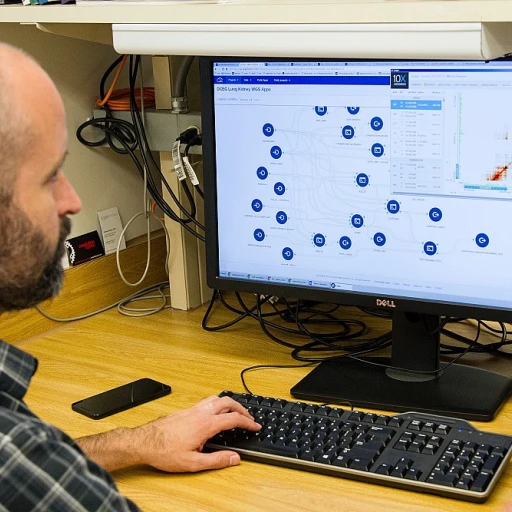
Understanding blockchain technology
The basics of blockchain
Blockchain technology sounds fancy, right? But at its core, it’s really just a way to structure data. Instead of a central authority overseeing everything, blockchain distributes this power amongst its users. Each ‘block’ in the chain has a record, and once it’s added, it can’t be changed. This makes it super secure and transparent.
According to a report by Deloitte, 74% of businesses see a compelling business case for using blockchain. This isn’t just tech giants, but also small startups and even some surprisingly traditional industries.
A brief history
Let’s rewind to 2008 when a mysterious figure, or group, called Satoshi Nakamoto introduced bitcoin. This was the first real-world use of blockchain. Since then, the blockchain landscape has exploded beyond just cryptocurrencies. Ethereum, for example, introduced smart contracts – these are essentially self-executing contracts where the terms are directly written into code.
How does it really work?
Imagine a digital ledger that’s open to everyone but controlled by no one. Each transaction gets a digital signature, ensuring authenticity. Nodes, or computers on the network, validate these transactions before they’re added to the ‘block’. Once a block is full, it gets added to the chain in a linear, chronological order.
The beauty of blockchain is its security. It’s kind of like writing in pen in a shared notebook. Even if someone tries to alter an entry, there’s a permanent trace of the original content.
Application beyond currency
Blockchain isn’t just about bitcoin or other cryptocurrencies. Its applications are vast and varied. From supply chain transparency, to voting systems, and even in the entertainment industry. And it’s making waves in areas you’d least expect.
For an in-depth dive on blockchain's broader impacts within software, you might check out the rise of blockchain in the future of software.
Blockchain and job market transformation
Job opportunities created by blockchain
The rise of blockchain technology is reshaping the job market in ways previously unimaginable. According to the World Economic Forum, blockchain is expected to generate 12 million jobs globally by 2025. Positions range from blockchain developers to legal consultants specializing in smart contracts.
Companies like IBM and PwC are already leveraging blockchain, creating an increasing demand for professionals skilled in this field. Deloitte's 2020 Blockchain Survey reported that 55% of top executives see blockchain as a critical priority. Thus, there's a surging need for project managers, data analysts, and cybersecurity experts related to blockchain technologies.
New skills and training programs
With this burgeoning job market, the skills required are evolving too. Traditional IT skills are being augmented with knowledge of distributed ledgers and cryptography. Universities and online platforms like Coursera and edX are offering specialized courses in blockchain technology. A report from LinkedIn noted a 300% increase in postings for blockchain-related jobs from 2019 to 2020, emphasizing the urgent need for talent development.
"We're seeing a massive shift towards blockchain literacy," says Dr. Steven Gordon, a professor at the University of Sydney. Real-world case studies from Blockchain Council show how practical applications of blockchain in supply chain management and financial services are driving curriculum changes in higher education.
Changing employment models
Blockchain isn't just creating jobs; it's redefining how we think about employment itself. With the rise of decentralized platforms, there's a shift towards more freelance and gig work. A study by Upwork shows that 35% of the U.S. workforce freelanced in 2020, a trend partly driven by blockchain-enabled platforms that prioritize transparency and security.
Freelancers now have the tools to ensure payment through smart contracts, and work history validation is becoming more straightforward thanks to immutable ledgers. This is fostering greater trust between freelancers and employers, while also enabling gig economy platforms like GigChain to thrive.
Expert insights on blockchain's job market impact
"Blockchain is transforming the job market in profound ways," says Alex Tapscott, co-author of Blockchain Revolution. "Not only is it creating new job categories, but it's also enhancing employment models by making transactions more transparent and secure."
Markus Stauble, CTO at Cryptocorp, adds, "The decentralization aspect is crucial. It empowers individuals to take control of their careers in a way that wasn't possible with traditional employment structures." This viewpoint is echoed by numerous industry experts, indicating a broad consensus on blockchain's transformative impact on jobs.
Enhancing transparency and trust in remote work
How blockchain elevates openness in telecommuting
There’s this buzz about blockchain's impact on emerging software technologies, but let's get into how it really changes remote work.
One of the biggies with blockchain is it can make things super clear. No more relying on someone else to tell you they're being honest; blockchain does that for you. According to IBM, 71% of global executives say they're placing a “big bet” on transparency, aiming to create better trust both externally and internally.
Real-time tracking for job progress
Blockchain lets you see what’s happening right now. Say you're hiring freelancers all over. With blockchain, you can track every task they do. No guessing, no waiting for updates. Just open your blockchain and there it is. A PwC report found that 84% of surveyed companies have at least some involvement with blockchain technologies, highlighting its growing acceptance and integration.
Record-keeping without tampering
Another cool thing? Records that can’t be fudged. Once data is on the blockchain, it’s locked in. If you need to verify work history or past projects, blockchain shows you the real deal, untouched and untampered. Experts like Don Tapscott, executive chairman of the Blockchain Research Institute, argue that blockchain’s most potent feature is its incorruptibility, making it a go-to for transparent record-keeping.
Smart contracts for smooth operations
Ever heard of smart contracts? These are self-executing agreements. They kick into action when conditions are met. Hiring someone for a project? The payment goes through only when the work’s done right. Which keeps everyone honest and happy. This aspect of blockchain—highlighted in a future of software blog—greatly streamlines remote work, ensuring automatic compliance.
The world of work is definitely shifting, with blockchain steering the ship towards more trust and transparency.
Impact of blockchain on freelance and gig economy
Revamping the Gig Economy through Blockchain
The gig economy has experienced a notable surge, with the number of gig workers in the U.S. reaching approximately 36% of the total workforce in 2021. This trend highlights the need for innovative methods to streamline payment methods and enhance security for freelancers.
Blockchain technology offers solutions that can revolutionize how gig work is structured. For instance, cryptocurrency payments allow workers to receive instant and low-cost transactions regardless of their geographic location. This could be a game changer, especially in regions where traditional banking systems are limited.
A study from Harvard Business Review pointed out that blockchain's automated contracts can simplify relationships between clients and freelancers. Smart contracts can ensure that freelancers get paid automatically when specific criteria are met, reducing disputes and late payments. This sort of automation not only saves time and effort but creates a fairer environment where both parties can thrive.
The integration of blockchain within platforms like Upwork and Fiverr is becoming more visible. These platforms are exploring blockchain options to provide better transparency in how gigs are handled. For example, using decentralized applications (dApps) helps protect gig workers from fraud by securely handling their agreements without the risk of a central authority altering the contract.
Experts like Craig Russo, co-founder of Polymath, suggest that blockchain can enhance trust within the freelancing space by making all transactions visible and unalterable. This transparency not only protects workers but attracts clients who are wary of scams.
Real-world examples showcase how blockchain applications are already making strides. Companies like Blocklancer utilize blockchain to securely connect clients and freelancers, while ensuring on-time payments through smart contracts. This model has shown significant improvements in the satisfaction rates of both freelancers and clients, demonstrating the value of blockchain technologies in the gig economy.
Looking ahead, trends indicate that more platforms will integrate blockchain technology, leading to a more efficient and reliable gig economy. Research from McKinsey highlights that 43% of gig workers would prefer payment in cryptocurrency, reflecting a growing acceptance and demand for blockchain solutions in the freelance space.
Overall, blockchain's ability to enhance security, payment efficiency, and transparency positions it as a vital player in the evolution of the gig economy.
Education and skill development for blockchain jobs
Growing demand for blockchain education
The rise of blockchain technology has ushered in a pressing need for individuals skilled in this domain. A report from LinkedIn highlighted that blockchain was the most in-demand hard skill in 2020(Forbes). The same report noted that blockchain expertise surpassed traditional tech skills like cloud computing and artificial intelligence.
Online courses and university programs
To meet this growing demand, many institutions and online platforms have launched blockchain courses. Coursera, for example, saw a 517% increase in enrollments for blockchain-related courses in the past few years(Coursera Blog). Furthermore, universities like MIT and Stanford now offer dedicated blockchain programs, reflecting the seriousness of incorporating blockchain education in mainstream academia.
Corporate training and certifications
Corporates too are playing a crucial role. Companies like IBM and Microsoft are not just looking for blockchain talent but are also investing in training their workforce. The IBM Blockchain Certification Program has seen a 300% increase in enrollments since its launch(IBM Essentials).
Expert insights on blockchain skills
Experts believe that understanding the technical aspects of blockchain is not sufficient. According to Don Tapscott, co-founder of the Blockchain Research Institute, professionals must also grasp the economic and social implications of blockchain(Blockchain Research Institute).
Case study: adoption of blockchain skill sets
Consider the case of ConsenSys, a blockchain technology company. Not only do they focus on hiring skilled professionals, but they also provide internal training programs for continuous learning(ConsenSys Academy). This holistic approach ensures that their team is always updated with the latest in blockchain technology and its applications.
Trends and future predictions in blockchain education
The demand for blockchain skills shows no signs of slowing down. According to a study by PwC, blockchain-related jobs are expected to grow at a rate of 35% annually by 2025(PwC). As more industries adopt blockchain, the gap between demand and supply of skilled professionals is likely to widen, making education and skill development even more crucial.
Blockchain’s role in human resources and recruitment
Streamlining hiring processes with blockchain
Recruitment is one long, tedious, and often complicated journey, but blockchain is here to smooth the way. By integrating blockchain tech, hiring managers can verify credentials instantaneously. This saves not just time but also a ton of headaches associated with background checks.
According to a study by IBM, 71% of HR leaders say employee data verification using blockchain can both validate worker credentials faster and ensure their authenticity. That’s a game-changer in terms of efficiency.
Real-world application
Take the case of Fujitsu, which has employed blockchain in its HR department. They use the technology to manage employee ID systems and reduce operational costs related to document verification. The company reported a 30% reduction in administrative overheads.
Privacy and security in HR
Another big win is in data security. HR departments handle heaps of sensitive information, and blockchain’s inherent design is a fortress against breaches. A report by Deloitte states that 56% of companies underestimate the risks of data security in HR. With blockchain’s encryption features, you can rest a bit easier.
Standardizing global recruitment
Moving beyond borders is another benefit. Blockchain facilitates a global standard for qualifications and experiences. Think no more wading through different educational standards or employment histories from various countries. Companies like aeternity Ventures have leveraged blockchain to create a unified system for tracking qualifications globally.
Expert opinions
Angela Hood, CEO of ThisWay Global, emphasizes, “With blockchain, we can create a more open and meritocratic job market. No more biases. Just pure talent.”
Case studies of companies adopting blockchain
Real-world examples of blockchain in companies
Let's peek into how real-world companies have embraced blockchain to reimagine their workflows and processes.
Ibm’s journey with blockchain
IBM has been a leader in adopting blockchain technology. IBM’s Food Trust Blockchain is a prime example; it creates a more transparent food supply chain, ensuring the authenticity and safety of food. According to IBM, over 18 million food products have been tracked using this system, providing more trust to consumers and reducing food fraud.
“By leveraging blockchain, we can improve the traceability and efficiency of our food supply chains significantly,” says Bridget van Kralingen, Senior VP of IBM Global Markets.
Walmart’s blockchain-backed supply chain
Walmart is another big player in utilizing blockchain tech. The company employs blockchain to track the origin of its products, enhancing food safety and reducing the time taken to track a product’s history from seven days to just 2.2 seconds. This swift tracking ability is a huge win for transparency and trustworthiness in the supply chain.
De beers' blockchain for tracing diamonds
De Beers, renowned for diamonds, uses blockchain to ensure the authenticity of its gems. By recording each diamond’s journey from the mine to the retail shop, blockchain helps combat the illicit diamond trade and confirms the genuineness of their products. As reported by Fortune, since its implementation in May 2018, this system has tracked more than 100 significant diamonds.
Automotive uses by volkswagen
Volkswagen leverages blockchain to track and enhance the value of its vehicles. Their blockchain solutions track the lifespan of car parts and ensure the authenticity of materials. This adoption not only promises better maintenance but also heightens the safety standards of the vehicles.
So, we see that companies across various sectors are not just experimenting with blockchain but are actively reaping its benefits. These real-world examples highlight the diverse potential of blockchain in transforming traditional business practices and boosting transparency, trust, and efficiency in the process.
Future trends and predictions on blockchain in work
Blockchain's influence on corporate structures
The integration of blockchain technology into corporate structures has been steadily growing. According to a study by Deloitte, 55% of large enterprises are already investing in blockchain solutions. These investments span various applications, from enhancing supply chain transparency to securing organizational transactions.
Emerging blockchain-based job roles
As blockchain technology becomes more entrenched in corporate operations, new job roles are emerging. Positions such as blockchain developer, blockchain project manager, and blockchain legal consultant are in higher demand. A report by LinkedIn noted a 33-fold increase in blockchain-related job postings from 2014 to 2018, reflecting a shift in the job market.
Blockchain and employee autonomy
Blockchain fosters a more decentralized work environment, granting employees greater autonomy over their tasks and schedules. Smart contracts, for example, can enforce agreements without human intervention, ensuring transparency and reducing conflict. Harvard Business Review highlights that 72% of employees feel more empowered in workplaces that adopt blockchain technology.
Challenges and controversies
Despite its promising prospects, the implementation of blockchain in the workplace isn’t without challenges. Issues such as scalability, energy consumption, and regulatory uncertainty remain significant barriers. Notably, Elon Musk has raised concerns about the environmental impact of blockchain, especially in the context of cryptocurrencies.
Looking ahead: expert insights
Experts believe that blockchain could revolutionize various aspects of the workplace. Don Tapscott, a prominent blockchain author, argues that blockchain could create a 'second era of the internet.' This sentiment is echoed by many in the field who see blockchain’s potential to redefine the job market, enhance transparency, and foster a new wave of innovation.
The future of blockchain in work is still unfolding, but the trends and insights we've gathered indicate that its impact will be profound and far-reaching. For more on how emerging technologies like blockchain are transforming software, check out our extensive guide on how blockchain is transforming the future of emerging software technologies.









